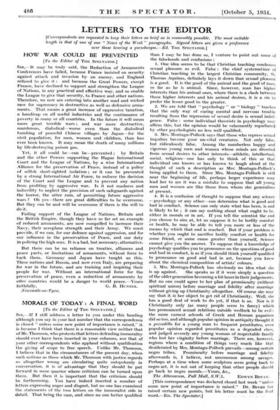MORALS OF TODAY : A FINAL WORD
[To the Editor of THE SPECTATOR.]
Sin,—If I still address a letter to you under this heading although you say in your last number that the correspondence is closed unless some new point of importance is raised," it is because I think that there is a reasonable view neither that of Mr. Thomson, who protests that letters defending immorality should ever have been inserted in your columns, nor that of your other correspondents who applaud without qualification the giving of scope to free speech. Unlike Mr. Thomson, I believe that in the circumstances of the present day, when such notions as those which Mr. Thomson with justice regards as altogether wrong are circulating quite outspokenly in conversation, it is of advantage that they should be put forward in some quarter where criticism can be turned upon them. But then it is important that the criticism should be forthcoming. You have indeed inserted a number of letters expressing anger and disgust, but no one has examined the statements of the two letters on the immoralist side in detail. That being the case, and since no one better qualified than I may be has done so, I venture to point out some of the falsehoods and confusions : 1. One idea seems to be that Christian teaching condemns sexual pleasure as evil. False : the chief systematizer of Christian teaching in the largest Christian community, St. Thomas Aquinas, definitely lays it down that sexual pleasure is a good. It is the good of the animal and the good-of man, so far as he is animal. Since, however, man has higher interests than his animal ones, where there is a clash between those higher interests and his animal desires, it is a sin to prefer the lesser good to the greater.
2. We are told that " psychology " or " biology " teaches that the only way of curing mental and nervous trouble resulting from the repression of sexual desire is sexual indul- gence. False : some individual theorists in psychology may affirm this, but the opinion would be vehemently repudiated by other psychologists no less well qualified.
3. Mrs. Montagu-Pollock says that those who repress sexual impulses become poor un-vital creatures. Not only false, but ridiculously false. Among the numberless happy and vigorous young men and women whose minds are diverted from sexual desires to other interests—athletic, intellectual, social, religious—one has only to think of this or that individual one knows or has known to laugh aloud at the thought of such a description as Mrs'. Montagu-Pollock's being applied to them. Since Mrs. Montagu-Pollock is still near the beginning of life, perhaps larger experience may lead her to see it was a mistake to suppose that all young men and women are like those from whom she generalizes at present.
4. It is a confusion of thought to suppose that any science —psychology or any other—can determine what is good and bad in conduct. Science can only state what has been, is and is likely to be ; it can say nothing about what ought to be, either in morals or in art. If you tell the scientist the end you choose to aim, at, let us suppose it to be bodily comfort or health, he may be able to tell you more or less of the means by which that end is reached. But if your problem is whether you ought to sacrifice bodily comfort or health for some friend, or some cause greater than yourself, Science cannot give you the answer. To suppose_that a knowledge of psychology qualifies you to pronounce on the questions of good and bad in conduCt, is as if you should think yourself qualified to pronounce on good and bad in art, because you knew about the chemical composition of artists' colours.
5. Mrs. Montagu-Pollock has obviously no idea, what she is up against. She speaks as if it were simply a question of the older generation becoming a bit laxer in their judgements. But no one could agree to her plan of promiscuity (without spiritual union) before marriage and fidelity after marriage without giving up Christianity altogether. Of course she may say that it is her object to get rid of Christianity. Well, she has a good deal of work to do yet, if that is so. Nor is it Christianity only (as many people seem to fancy) which has pronounced sexual relations outside wedlock to be evil : the more earnest schools of Greek and Roman paganism did so too, and although popular opinion in antiquity thought it a peccadillo for a young man to frequent prostitutes, even popular opinion regarded prostitutes as a degraded class, and judged severely any young woman of respectable family who lost her virginity before marriage. There are, however, regions where a condition of things very much like that desiderated by Mrs. Montagu-Pollock prevailsamong certain negro tribes. Promiscuity before marriage and fidelity afterwards is, I believe, not uncommon among savages. Perhaps at a time when some sculptors seem going back to negro art, it is not out of keeping that other people should go back to negro morals.—Yours, &c.,
The Athenaeum, Pall Mall, S.W.1. EDWYN BEVAN.
[This correspondence was declared closed last week "unless some new point of importance is raised." • Dr. Bevan has raised • certain new points, but his letter must be the final word.—En. The Spectator.]










































 Previous page
Previous page